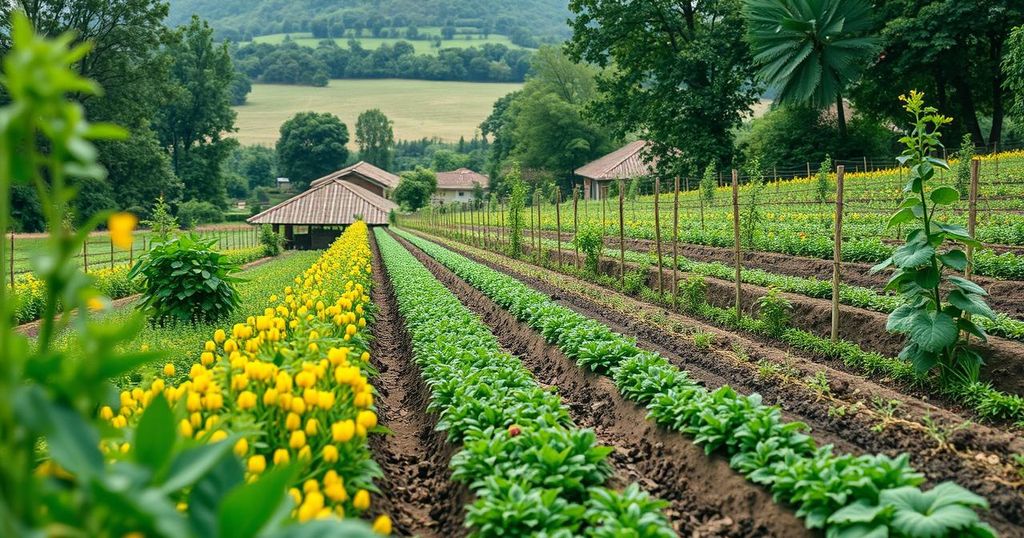Innovation-Driven Green Transition Essential for Global Agri-Food Sector
A global panel of experts has called for an innovation-driven green transition in the agri-food sector to combat climate change impacts. During the 2024 World Agri-Food Innovation Conference, they highlighted the need for substantial technological advancements to mitigate the predicted decline in food production due to rising global temperatures. Experts asserted the importance of sustainably producing food while protecting the environment, with China identified as a hopeful leader in enhancing global food security.
A panel of experts has emphasized the critical importance of an innovation-driven green transition in the global agri-food system to address rising carbon emissions and combat climate change’s detrimental effects on agricultural production. These insights were shared during the recent World Agri-Food Innovation Conference held in Beijing, organized by China Agricultural University. Sun Qixin, President of China Agricultural University and an esteemed academician, highlighted that mainstream theories predict a decline of 6 to 8 percent in food output for each degree Celsius increase in global temperatures, unless technological advancements are leveraged to mitigate these challenges. He stressed the non-uniformity of climate impact worldwide, noting that while certain regions may gain from warmer climates, irregular weather patterns have emerged as significant disruptors to global food production. Furthermore, transitioning to greener agricultural practices requires a reduction in traditional agricultural inputs, such as fertilizers. Therefore, investing in research and innovation is paramount to ensure sustainable agricultural output continues. “We must proceed in this direction despite the challenges,” Professor Sun added. Fu Wenge, another academic from China Agricultural University, noted that sometimes substantial changes can arise from minor, economically viable adjustments in management practices rather than radical breakthroughs. He provided an example of the university’s Science and Technology Backyard project, designed to connect students with smallholding farmers to promote sustainable practices and high-yield crop varieties, a model that also has potential applications in Africa and beyond. Ismahane Elouafi, Executive Managing Director of the Consultative Group on International Agricultural Research (CGIAR), asserted that achieving a green transition involves multifaceted innovations across technological, policy-making, and institutional frameworks. “The impact of climate change is multiplying every day, and the only way forward for us is to adopt innovation in its broad sense to really transform the agriculture system,” Elouafi stated. The experts underscored the necessity of producing more food with a reduced carbon footprint while boosting environmental protection. Patrick Caron, Vice-Chair of the CGIAR system board, remarked on humankind’s historical success in increasing food production but emphasized the need to do so with greater sensitivity to climate change impacts and natural resource degradation. China, amidst intensifying global food insecurity challenges, has been identified as a beacon of hope, with ambitions to increase its annual food production capacity from 695 million metric tons to approximately 700 million tons by 2030. Elouafi noted, “I think China really is a bright spot in the global picture, and not only in increasing productivity in a very smart way, but also in reducing poverty and hunger.” The significance of such progress is underscored by the celebration of World Food Day on October 16, a global observance aimed at fostering awareness and action against hunger. In conjunction with this, Foreign Ministry spokeswoman Mao Ning underscored China’s commitment as the world’s largest food producer, stating, “China has provided more funding and experts and undertaken more projects than any other developing country under the framework of the Food and Agriculture Organization’s South-South Cooperation Programme.” As China continues to prioritize collaboration on global food security, the efforts towards innovation in agriculture are essential for ensuring a world free from hunger.
The article discusses the imperative for the global agri-food sector to innovate and transition towards greener practices in light of significant climate change challenges. Experts participating in the World Agri-Food Innovation Conference in Beijing shared insights on how the agricultural system contributes substantially to greenhouse gas emissions. The need for technological advancements to counter predicted declines in food production due to global warming is emphasized, alongside the importance of sustainable agricultural practices. The role of China as a leading force in enhancing food security globally is highlighted, especially in the context of ambitious production goals and successful poverty alleviation initiatives.
In summary, the green transition of the agri-food sector is essential for addressing the dual challenges of climate change and food insecurity. Experts advocate for innovation in agricultural practices, emphasizing that these changes must be sustainable and inclusive. China’s commitment to enhancing its food production capacity, alongside initiatives to reduce poverty and hunger, positions it as a global leader in this critical endeavor. Collaborative efforts and technological advancements will be crucial in ensuring a resilient and sustainable agri-food system.
Original Source: global.chinadaily.com.cn




Post Comment